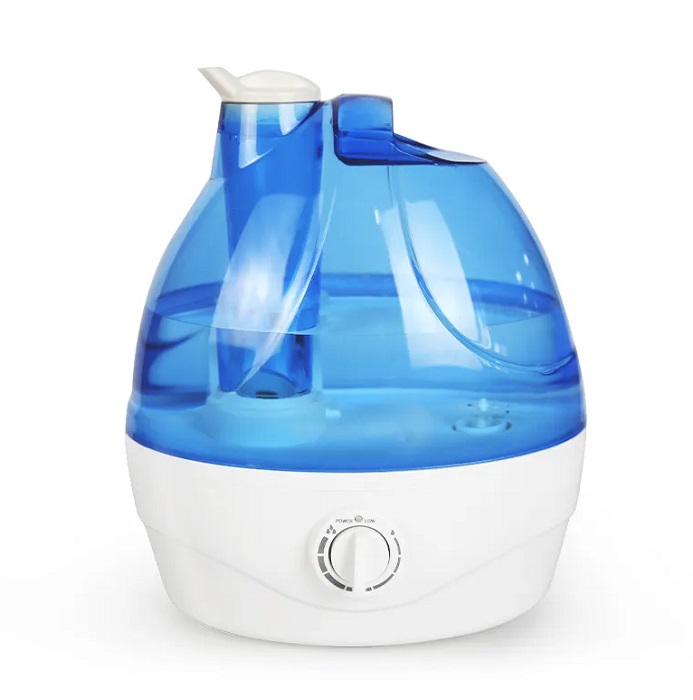Can a Humidifier Help Your Atopic Dermatitis?
Dry air can worsen symptoms of atopic dermatitis, the most common form of eczema. A humidifier might make a difference — but you need to use it safely.

Cool-mist humidifiers are generally safer than steam humidifiers (also known as vaporizers).
Now more than ever, people with atopic dermatitis, the most common form of eczema, can minimize skin dryness, irritation, and itch with targeted medications. But home remedies and natural treatments can also make a real difference.
Among the nonmedical options are humidifiers, devices that release water vapor or steam into the air. For people with atopic dermatitis, who may have rough, leathery, or scaly skin patches, these devices can be a boon.
“You definitely don’t want an environment that’s really dry for eczema — that’s not good,” says Jenny Murase, MD, a dermatologist at the Palo Alto Medical Foundation in Mountain View, California. Dry air, she explains, saps the skin of natural moisture, which is a particular issue for people with atopic dermatitis because their skin doesn’t retain moisture well.
Humidifiers are no substitute for medications, Dr. Murase emphasizes, but they may help in certain situations.
A study published in the Korean Journal of Dermatology concluded that humidifiers “positively affect skin hydration and skin barrier function.” Other research in Clinical, Cosmetic and Investigational Dermatology suggested that a humidifier in the home can have a positive impact in preventing eczema flares.
Benefits of a Humidifier May Vary Depending on Where You Live
The National Eczema Society recommends keeping living and work spaces at 30 to 60 percent humidity. (A device called a hygrometer can provide a humidity reading.)
In the Bay Area near San Francisco, where Murase practices, natural humidity generally reaches those levels. But that may not be true in places with drier climates like Nevada and Colorado, where humidifiers may be needed to bring humidity up to the ideal range.
It’s worth noting that too much humidity can be problematic for people with atopic dermatitis. The National Eczema Association warns that high humidity can lead to increased sweating, which may result in prickly-heat-type skin symptoms. Plus excessive humidity can lead to dampness and mold in a home, and mold spores are a known trigger for eczema flares, notes the National Eczema Society.
Humidifiers May Help More in Winter Months
Cold temperatures affect humidity levels, so humidifiers may do the most good during the winter in places where temperatures drop.
“In the Northeast where I am, or the Mid-Atlantic, the winters get cold and dry,” says Bruce Brod, MD, clinical professor of dermatology and co-director of the occupational and contact dermatitis program at Penn Medicine in Philadelphia. “With low humidity, your skin is going to feel drier and you’re going to have to work a little harder to keep it well moisturized.”
Humidifiers can be useful in summer as well to counteract the drying effect of air-conditioning.
Choosing a Humidifier Type
Any type of humidifier is going to help atopic dermatitis, whether it produces hot or cool mist.
Healthychildren.org, a parenting website from the American Academy of Pediatrics, recommends a whole-house humidifier or a cool-mist room humidifier over a steam humidifier (also called a vaporizer). Steam humidifiers use a heating element to produce a hot or warm mist and may pose a burn risk.
One drawback of some cool-mist humidifiers is that they can be noisy because they rely on a fan to blow small water droplets into the air, notes Consumer Reports.
Ultrasonic, impeller, and evaporative humidifiers are different types of cool-mist devices. The ultrasonic units use high-frequency sound vibrations to create an extra-fine water mist, while an impeller employs a rapidly rotating disk. An evaporative humidifier uses a fan to blow air through a moistened absorbent material, such as a belt, wick, or filter.
Keeping Humidifiers Clean Is Key
As the Environmental Protection Agency (EPA) notes, bacteria and mold can easily grow in humidifier water tanks, so proper cleaning is essential. It’s particularly important for people with atopic dermatitis.
Murase explains, “Because the skin barrier is compromised with eczema, bacteria can jump into the skin and infect it, in which case the eczema gets much worse.”
Even though any humidifier with a tank of standing water has the potential to breed microorganisms, the EPA suggests that cleaning ultrasonic and impeller units is especially vital.
The federal agency advises a daily cleaning regimen that includes emptying the tank and wiping all its surfaces dry before refilling with water. Use a cleaning or disinfecting agent, followed by a thorough rinsing to remove any lingering chemicals that could potentially damage your lungs if you breathe them in.
Research studies underscores the importance of rinsing a humidifier thoroughly after cleaning. A research review of dozens of studies, published in the Journal of Korean Medical Science, found a clear correlation between humidifier disinfectants and lung injury.
The Bottom Line on Humidifiers for Atopic Dermatitis
If you have atopic dermatitis, feel free to try out a humidifier and see if it works for you, taking care to keep it clean.
“Adding a bit more humidity to the air probably offers a slight benefit,” says Dr. Brod. He adds that other actions you can take — applying moisturizer regularly, avoiding hot baths — will have a more significant impact.
